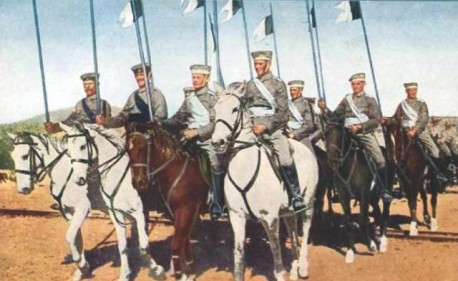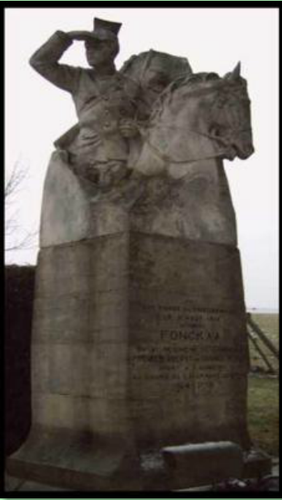One Hundred Years

(German mounted lancers- Uhlans- who opened our version of the Hundred Year’s War.)
I am not going to stop writing the car stories, but there is a reason I am going to take a break from the subject today. As you may recall, we lost our last American veteran of the Great War last February. His name was Frank Buckles, and he was 110 years of age when he departed. I was amazed by his survival through all the subsequent history. Grandpa was a doughboy, too, and he only made it to 1944.
So much insanity has transpired since then, most of it directly attributable to great policy mistakes that began building after the Franco-Prussian War of 1870, and the humiliation of a generation of Frenchmen.
Jeff Lipkes summed it up pretty nicely yesterday. He knows this stuff pretty well- he is the Princeton PhD who wrote “Rehearsals: The German Army in Belgium, August 1914.”
He had a shorter piece in The American Thinker yesterday titled “The Lessons of World War One.” I knew some of them already. The Great War changed everything, ended empires, transformed a world and killed millions. So many millions, in fact, that Jeff suggests that historians cannot agree to the nearest ten million how many deaths by violence have resulted since.
At 8:05 AM two Belgian border guards at the German border were approached by a squadron of German Lancers. Here are the words that began the end of the world:
Belgian guard: “Belgian frontier!”
German officer: “I’m perfectly aware of that. But the French have crossed the border and we’re going to continue on our way.”
A paper was handed over from the man on horseback to the man on the ground. The Belgian guards read these words: “It is with greatest regret that German troops find themselves forced to cross the Belgian frontier.” The remainder of the message urged the Belgians to use discretion and save their country “from the horrors of war.”
As we know, it did not work out that way. Initially there was no resistance to the German incursion, and other formations of Germans crossed the frontier over the course of the morning, including troops on bicycles. The Belgian High Command was notified, and the message that an invasion had begun arrived at the Foreign Ministry during the lunch hour. The news was cabled to the Belgian legations in London and Paris.
And so the news spread that the War To End Wars had begun.
The Belgians were determined to exercise discretion, and the Rules of Engagement, circa August 1914, were not to trifle with the Germans. This war thing is an emotional business, though, and almost exactly a century ago, to the minute, an excited Belgian trooper named Antoine-Alphonse Fonck fired on some Uhlans near the town of Thimister.
German cyclists fired back and killed him.
And so it began. And it really hasn’t ended yet, has it?

(Antoine-Alphonse Fonck memorial on Charlemagne Boulevard in Thimister, in Belgium’s Liège province).
You might like Jeff’s whole article, and a short account of the spectacular mis-steps and might-have-beens that could have altered the horror that produced our modern world:
http://www.americanthinker.com/2014/08/the_lessons_of_world_war_i.html
Copyright 2014 Vic Socotra
www.vicsocotra.com
Twitter: @jayare303
